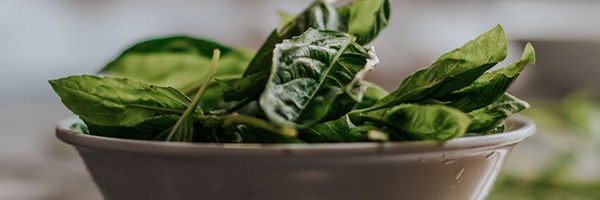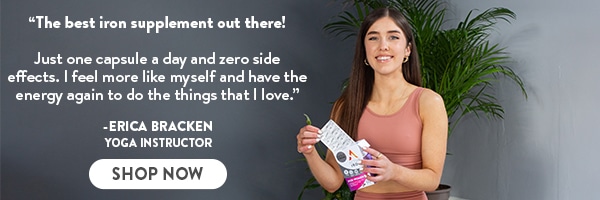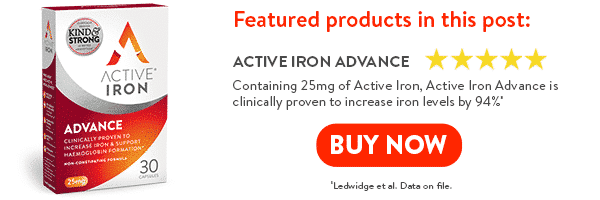- Iron supplements for blood donors
- Oral iron supplements
- Do Iron Supplements Cause Constipation?
- Iron supplements for athletes
- The best iron supplements for vegetarians
- The best iron supplement for sensitive stomach
- Benefits of iron for your immune system
- How to take iron supplements for best absorption?
- What does iron saturation mean?
- What is the Function of Iron in our Bodies?
- Iron supplement side effects
- How Much Iron Per Day for a Woman?
For those who follow a vegetarian or plant-based diet, iron supplements for vegetarians are a reliable and easy way to reduce the risk of low iron levels and support overall physical and mental health.
It can be challenging to get sufficient iron from food alone for those who avoid or restrict animal-based sources of iron.
An iron supplement suitable for vegetarians can be an excellent solution to support iron levels alongside a healthy and balanced plant-based diet.
In this article, we’ll cover the following topics and frequently asked questions:
- Iron for vegetarians
- How much iron do vegetarians need?
- Iron sources for alternative diets
- Do vegetarians need iron supplements?
- Iron supplements suitable for vegetarians
- Guidelines for taking iron supplements as a vegetarian
- How to improve iron absorption for plant-based diets

Iron for vegetarians
Put simply; iron is essential to life and is needed to help stay healthy, both mentally and physically. This powerhouse nutrient plays a crucial role in many bodily functions, including energy production, cognitive function and immune function.
Iron is critical to powering our energy levels as it is an essential building block for forming red blood cells (haemoglobin), which transfer oxygen around our bodies. As a result, our bodies don’t get enough oxygen without adequate iron, leading to tiredness and fatigue.
While everyone needs to maintain their iron levels to stay healthy and well, vegetarians are among several groups, including women and athletes, who have an increased daily iron need.
The issue is that plant-based dietary iron is more difficult for the body to absorb compared to animal-based nutritional iron. So, while those on restricted diets, such as vegetarians, can naturally get iron through food, it can be challenging. For this reason, they are at a higher risk of low iron levels.
To counter this challenge, taking iron supplements for vegetarians can be a great way to support iron levels alongside a healthy and balanced plant-based diet.
How much iron do you need as a vegetarian?
While iron is a fundamental nutrient, we all need to support vital body functions, getting enough iron is a common nutritional issue. But, unfortunately, a massive 2.1 billion people¹ worldwide don’t get enough iron to meet their daily requirements.
Everyone should know how much iron they need and ensure they meet that need, especially those who fall into one or more categories at increased risk of low iron intake. This includes women, pregnant women, blood donors, active exercisers and athletes, and those on restricted diets, such as vegetarians.
While men over 18 years need 8.7mg daily iron, women typically need almost twice as much, approximately 14.8mg. Women of reproductive age can also lose up to 250 mg of iron per menstrual cycle. In addition, due to increased blood volume, pregnant women may need as much as 30-60 mg of iron daily.
Those on a restricted diet, including vegetarians of any gender, also have an increased daily iron need. While there are many benefits to following a plant-based diet, non-animal dietary iron is more difficult for the body to absorb. As a result, iron requirements for vegetarians are 1.8 times higher² compared to non-vegetarians.

Iron sources for alternative diets
The body cannot produce iron on its own. Therefore we need to meet our daily iron needs through food or iron supplements.
When looking at iron from food, it’s essential to understand the different types of iron: haem and non-haem. Haem-iron is found in animal sources, such as red meat, offal, poultry, and fish. This type of iron is the easiest for our bodies to absorb.
On the other hand, non-haem iron is found in plant-based sources, including fortified cereal, milk and bread, rice, oats, nuts, beans, and leafy greens.
Vegetarians or those who follow an alternative diet should aim to incorporate these and other foods high in iron to support their higher-than-average iron needs.
Unfortunately, non-haem iron is more difficult for the body to absorb. So even carefully planned vegetarian diets that include multiple sources of non-haem iron may still fall short of the daily recommended target.
For this reason, Iron supplements for vegetarians are an easy, reliable and safe alternative to keep iron levels topped up. Taking just one Active Iron capsule per day is clinically proven to tackle absorption issues and help meet vegetarian’s increased daily iron requirement. Thanks to Active Iron’s ground-breaking formula, it also doesn’t cause unwanted side effects, such as bloating and constipation, that are often associated with iron supplements for vegetarians.
Do vegetarians need iron supplements?
While vegetarians can meet their iron needs through diet alone, the body cannot absorb iron from plants (non-haem iron) as efficiently as iron-rich animal products (haem-iron).
As non-haem iron is less readily absorbed, iron requirements for vegetarians are 1.8 times higher than for non-vegetarians².
So, even those who stick to a varied and balanced vegetarian diet and consume adequate (non-haem) iron can find it hard to know if they are getting all the iron their bodies need. And in many cases, vegetarians may find themselves iron-deficient, lacking energy and feeling fatigued.
Thankfully, iron supplements for vegetarians, like Active Iron, are a safe and straightforward solution to replenish iron stores, supporting iron and energy levels.

Iron supplements suitable for vegetarians
If you are considering adding an iron supplement to your diet, the next step is finding a quality iron supplement that fully meets your needs. But what are the things you should be looking out for when choosing iron supplements for vegetarians?
A wide variety of iron pills, powders, liquids and other products are available online and over the counter. But while there’s no shortage of options, finding the best one for you can be overwhelming.
It’s wise to be aware that not all iron supplements are created equal and be mindful of ingredients, side effects, formulation, clinical evidence and dose.
- Are the ingredients in the supplement suitable for a plant-based diet? Many over-the-counter iron supplements contain iron from animals, ingredients from fish or other proteins from animals.
- Some iron products contain unnecessary ingredients such as artificial preservatives, gluten, yeast and sugar.
- Many iron supplements cause side effects such as nausea, constipation, and bloating. 50% of people stop taking iron because of the off putting side effects
- you need to consider the dose and formulation of iron supplements for vegetarians. The amount of elemental iron in supplements ranges from 100mg to 5mg, meaning that some iron supplements will better meet the body’s iron needs.
Different product formulations affect how much iron the body absorbs. According to a journal in the National Centre for Biotechnology Information, the amount may range from only 5% to 35%.
Those looking for iron supplements for vegetarians can trust that Active Iron suits their plant-based diet and nutritional needs. Active Iron supplements contain only haem sources of iron and are free from artificial preservatives, gluten, yeast and sugar.
You can also rely on Active Iron to provide the necessary dose of iron. Active Iron products contain 100-179% of the recommended daily allowance of iron. Therefore the dosage ranges from 14mg to 25mg, depending on the individual’s iron needs.
Importantly, unlike most iron supplements, Active Iron is clinically proven to provide 2X better absorption of iron sulfate³ and increase iron levels by 94%⁴. This superior absorption is down to Active Iron’s ground-breaking protein formula targets the site where the body naturally absorbs iron, the DMT-1, increasing the amount of iron absorbed.
Active Iron’s innovative new system also reduces the common side effects people experience from iron supplements. For example, Active Iron’s non-constipating formula is less likely to cause gut irritation compared to other iron supplements, meaning it’s kind on your stomach.
Active Iron’s award-winning supplement range includes various products to meet different people’s needs. The range consists of iron- and non-iron-based food supplements to support your health on many levels.
Guidelines for taking iron supplements as a vegetarian
If you are taking iron supplements for vegetarians, there are a few practical tips to follow for maximum iron absorption and to avoid feeling sick.
The best time to take iron is on an empty stomach, so ideally, at least one hour before or two hours after eating. When it comes to exercise, take them at least one hour before your workout or two hours post-workout to ensure optimum absorption.
Taking iron supplements on an empty stomach is the best approach to ensure maximum iron absorption. However, many iron supplements cause gut irritation, leading to unwanted side effects like bloating, nausea and constipation. Taking iron on an empty stomach can exacerbate these issues and make people feel sick.
If you have a sensitive stomach, it’s advisable to take iron with food. In this case, as discussed below, avoid taking supplements alongside milk, calcium or antacids, and don’t drink tea or coffee an hour before or after because they will lower your ability to absorb iron.
Luckily, Active Iron’s innovative formulation reduces the common side effects people experience from iron supplements. Active Iron is clinically proven to cause less oxidation compared to other iron supplements³. Even for people with sensitive stomachs, Active Iron is gentle enough to take on an empty stomach.
If you are under medical care and unsure if an iron supplement is suitable, please consult with your Pharmacist or GP for further advice. You can also refer to the FAQ section on Active Iron’s website.
How to improve iron absorption for plant-based diets
We know that it’s more difficult for the body to absorb iron from plant-based foods, but did you know that iron absorption can be inhibited or improved depending on the other foods in your diet? There are several dietary factors to be aware of to ensure you’re maximising the amount of iron you absorb from your diet.
Firstly, be mindful that certain compounds in food can inhibit iron absorption. These include phytates, found in whole grains and legumes, and tannins, found in tea and coffee. As a result, even vegetarian diets rich in plant-based iron may not provide the body with enough iron.
It is recommended to avoid consuming caffeinated drinks during mealtimes, as tannin-rich tea and coffee temporarily stop your body from absorbing iron. Don’t worry; you don’t have to cut coffee and tea out of your diet completely. Simply wait an hour after taking an iron supplement or eating your iron-rich meal to drink coffee or tea again.
People taking iron supplements for vegetarians should also drink tea or coffee at least one hour before or after taking their daily dose of iron.
A delicious way to boost your iron absorption is by eating Vitamin C-rich foods. Eating non-haem iron foods with Vitamin C can also increase absorption by five times. To support your iron levels, include vitamin C-rich foods in your plant-based diet.
Colourful fruits like oranges, blueberries, strawberries, and kiwis are well-known sources of Vitamin C. Lesser-touted Vitamin C powerhouses include vegetables like potatoes and broccoli. Active Iron products contain Vitamin C alongside iron, so you can be sure you’re maximising your body’s ability to absorb as much iron as possible.

¹Lopez et al. Iron Deficiency Anaemia, Lancet 2016; 387: 907–16.
²Pawlak, Roman et al. “Iron Status of Vegetarian Adults: A Review of Literature.” American journal of lifestyle medicine vol. 12,6 486-498. 16 Dec. 2016, doi:10.1177/1559827616682933.
³Wang et al. 2017, Acta Haematologica, 138: 223-232.
⁴Ledwidge et al. 2021, Data on file. doi: https://doi.org/10.1101/2021.09.01.21262983



